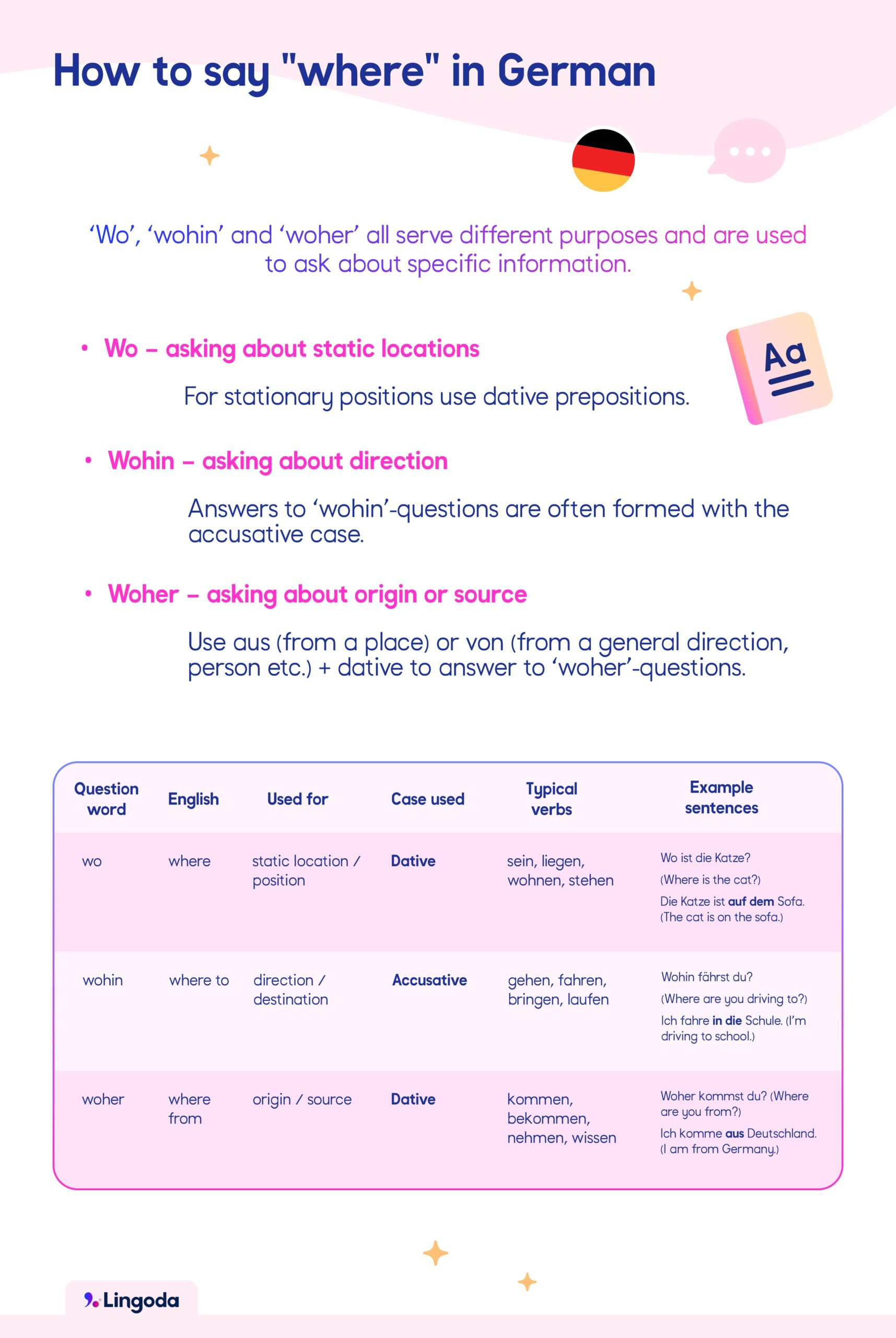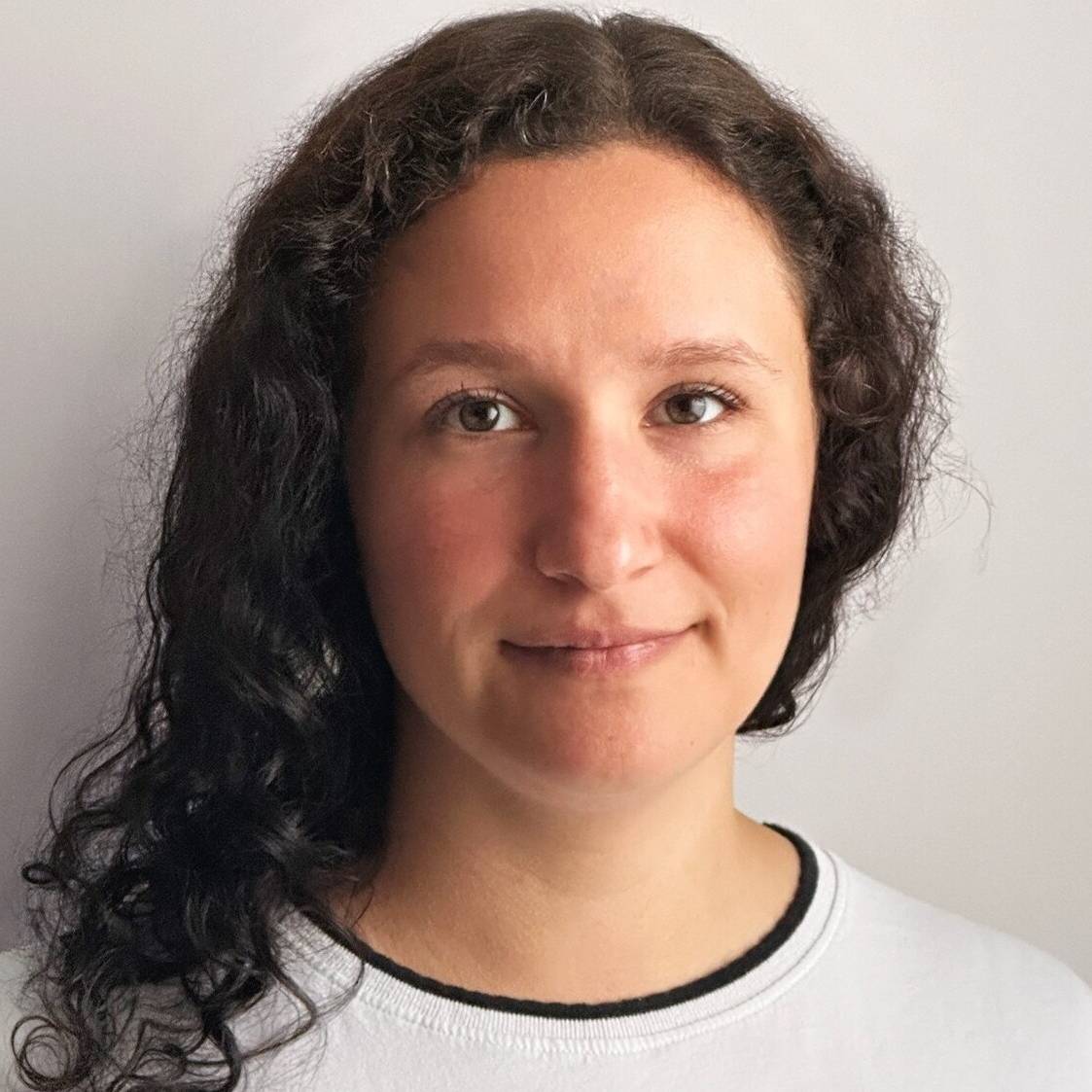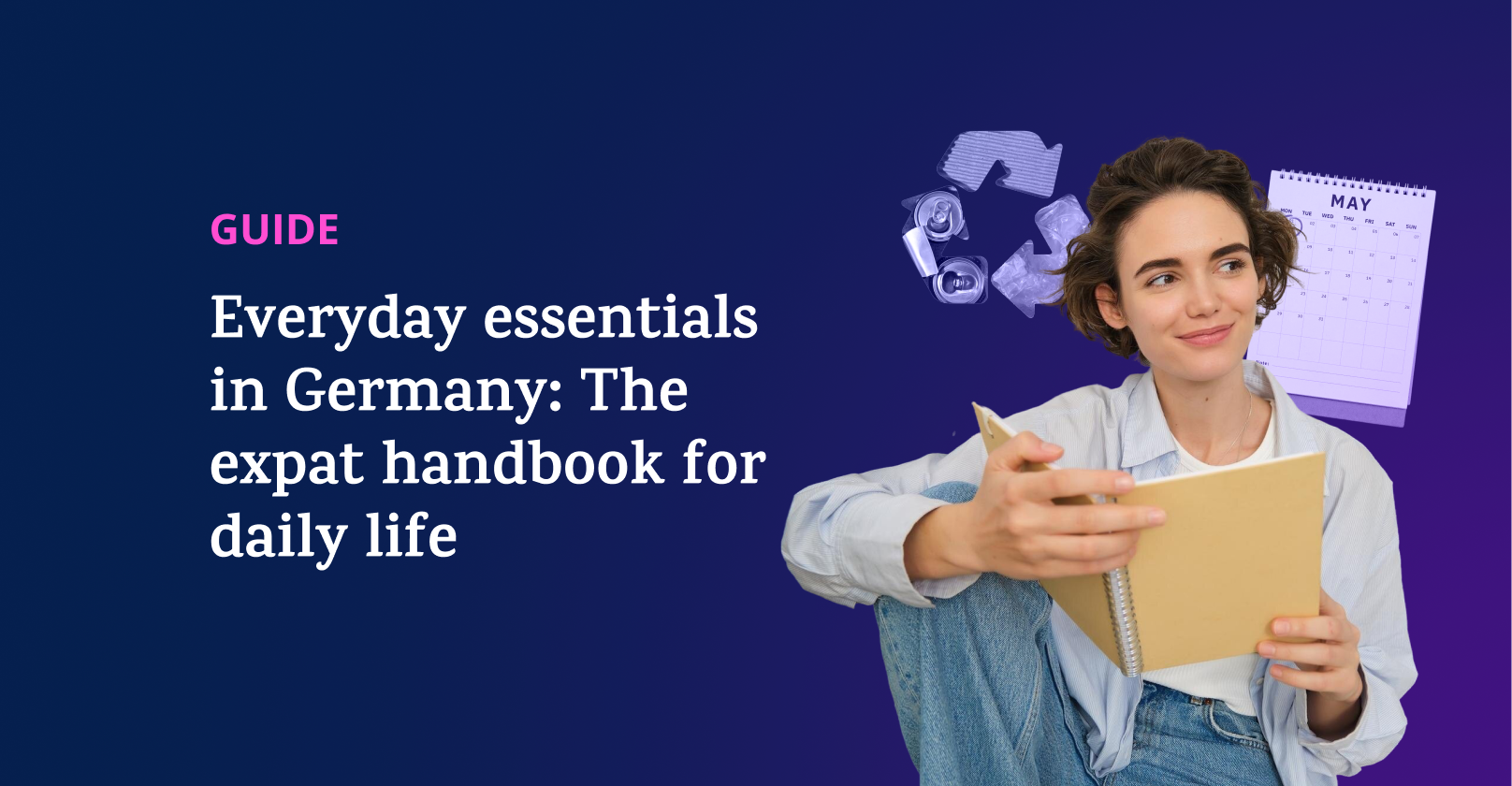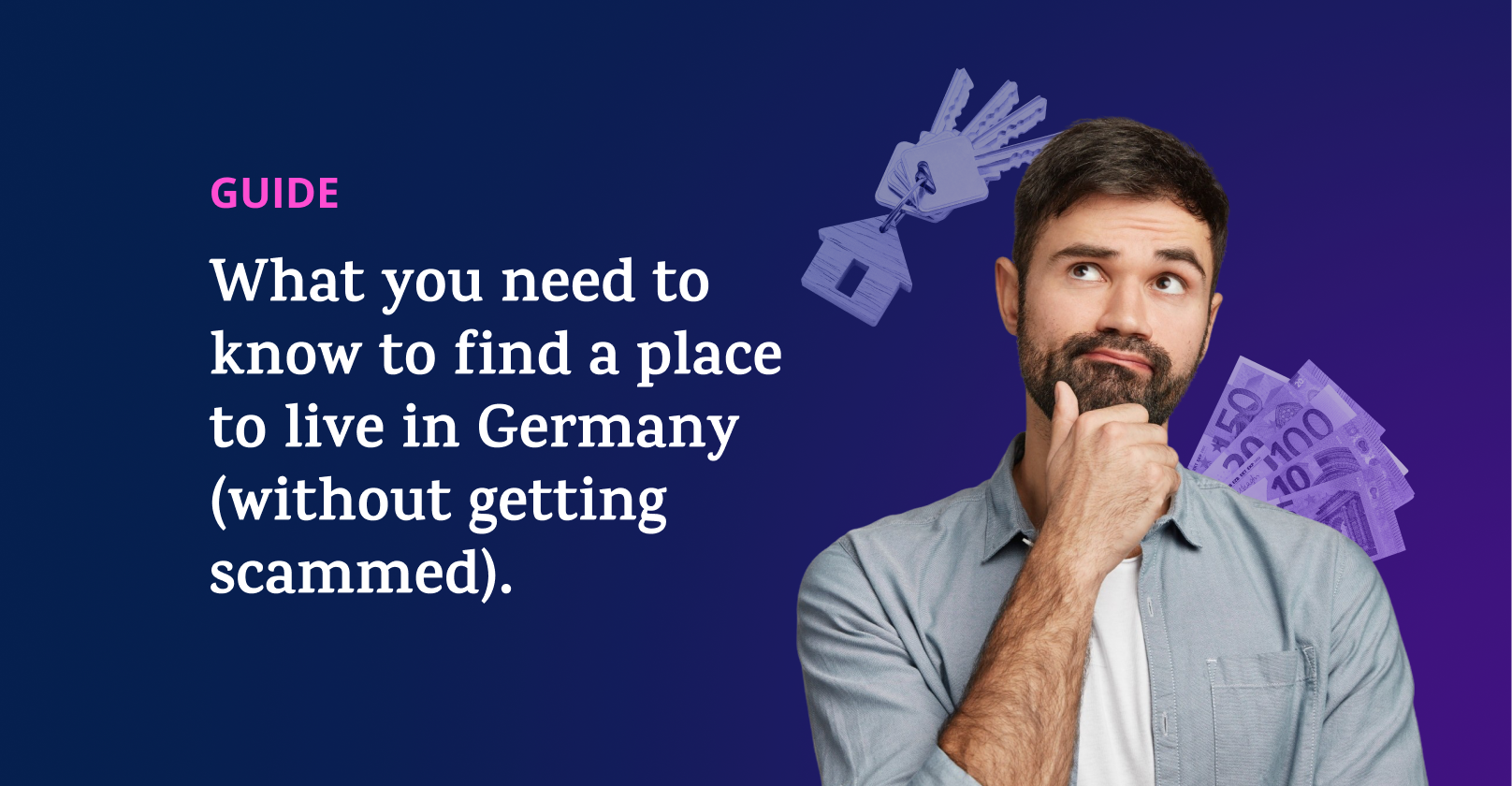Wo, wohin, woher: How to say ‘where’ in German

Whether you ask someone to describe their location, origin or destination in English, you typically rely on just one word: where. In German, things aren’t so simple. The English “where” splits into three distinct German words — wo, wohin and woher — each with its own specific meaning.
Each of these three question words serves a different purpose, leaving no room for misunderstandings. In this article, we’ll explain exactly what each word means and review how to use them in everyday situations.
- Introducing wo, wohin and woher
- Wo: When asking about static locations
- Wohin: When asking about direction
- Woher: When asking about an origin or source
- FAQs
Introducing ‘wo’, ‘wohin’ and ‘woher’
Wo, wohin and woher all serve different purposes and refer to specific types of information:
- Wo is used to ask where someone is located.
- Wohin is used to ask where someone or something is going.
- Woher is used to ask where someone or something is coming from.
To clarify the difference, let’s put this in other words:
- Wo asks about a static location (i.e., where something or someone is).
- Wohin asks about a direction or destination (i.e., where someone or something is going).
- Woher asks about the origin (i.e. where someone or something is coming from).

Learn German with Lingoda
How it works

‘Wo’: When asking about static locations
What ‘wo’ means and when to use it
Wo means “where” and is used to ask about location. As a rule of thumb, use wo when there's no movement involved — for example, when you're asking about a static place or position.
It can help to associate wo with the question, “In what place?”.
Use wo when asking about:
- Someone’s current location
- The location of an object
- Where something is taking place
In German, stationary positions are usually expressed with dative prepositions. This is why you’ll typically encounter the dative case in answers to questions with wo.
Here’s an example:
- Wo ist die Katze? (Where is the cat?)
- Die Katze ist auf dem Sofa. (The cat is on the sofa.)
The prepositional phrase “auf dem Sofa” is formed by using the preposition auf with the dative case of the noun (dem Sofa).
Typical sentence structure and verbs
To give you a better understanding of how wo is used in German, we’ve compiled a table of basic German sentences with verbs that indicate a static location or state. These verbs often appear in “Wo?” questions.
| Verb | Meaning | German | English |
| sein | to be | Wo ist mein Handy? | Where is my phone? |
| liegen | to lie (be lying) | Wo liegt mein Schlüssel? | Where are my keys? |
| wohnen | to live | Wo wohnst du? | Where do you live? |
| stehen | to stand | Wo steht dein Auto? | Where is your car parked? |
| hängen | to hang | Wo hängt das Bild? | Where does that picture hang? |
‘Wohin’: When asking about direction
What ‘wohin’ means and when to use it
Wohin translates to “where to” in English. It's used when asking about direction or destination — that is, whenever there’s movement or a change of location involved.
Unlike wo, which asks about static positions, wohin is all about the movement from one place to another.
The answers to “Wohin?” questions are often formed with the accusative case.
Here’s an example:
- Wohin fährst du? (Where are you driving to?)
- Ich fahre in die Schule. (I’m driving to school.)
The prepositional phrase “in die Schule” is formed by combining the preposition in with the accusative case of the noun (die Schule).
Typical sentence structure and verbs
Are you curious how questions with wohin are used in everyday German? The following examples all follow a typical sentence structure: wohin + verb of motion + destination (accusative).
| Verb | Meaning | Example Sentence | English Translation |
| gehen | to go | Wohin gehst du?Ich gehe in die Küche. | Where are you going?I’m going to the kitchen. |
| fahren | to drive/travel | Wohin fährt der Zug?Nach München. | Where is the train going?To Munich. |
| fliegen | to fly | Wohin fliegt ihr?In die USA. | Where are you flying?To the USA. |
| laufen | to run/walk | Wohin läuft das Kind?Auf den Spielplatz. | Where is the child running?To the playground. |
| stellen | to place (upright) | Wohin stellst du die Tasche?Neben den Tisch. | Where are you putting the bag?Next to the table. |

‘Woher’: When asking about origin or source
What ‘woher’ means and when to use it
Woher is used to ask about the origin of a person or object. Use it when you’d like to know where someone or something is coming from.
Typical prepositions for answers to questions with woher include aus (from a place) and von (from a general direction, person etc.). These prepositions are always followed by the dative case.
Here’s an example:
- Woher kommst du? (Where are you from?)
- Ich komme aus Deutschland. (I am from Germany.)
The prepositional phrase “aus Deutschland” is formed by combining the preposition aus with the dative case of the noun (Deutschland), which in this case has no article.
Common verbs and phrases
Just like with wo and wohin, there are several verbs and prepositions that are deeply connected with the question, “Woher?”.
Fun fact: Woher kommst du? (Where are you from?) can have different layers of meaning. Someone could be asking about your heritage, but depending on the tone and context, they could also be referring to where you physically were before arriving at your present location.
| Verb | Preposition | Example Sentence | English Translation |
| kommen | aus | Woher kommst du? Ich komme aus Italien. | Where are you from?I’m from Italy. |
| kommen | von | Woher kommt das Paket? Es kommt von meiner Schwester. | Where is the package from? It’s from my sister. |
| nehmen | von | Woher hast du das Buch?Vom Tisch. | Where did you get the book from?From the table. |
| zurückkehren | aus | Woher bist du zurückgekehrt?Aus dem Urlaub. | Where did you return from?From vacation. |
| wissen | von | Woher weißt du das? Von meinem Bruder. | How do you know that? From my brother. |
When should I use ‘wo’ vs ‘wohin’?
Use wo when you’re asking about a static location. Use wohin when you’re asking about a direction or where something is going, which involves movement.
Is ‘woher’ a compound word?
Woher is a compound word in German. It combines wo (where) and her (from here) to form a single word. It’s used to ask about the origin or source of something.
Time to practice ‘wo’, ‘wohin’ and ‘woher’
Now that we’ve talked about the difference between wo, wohin and woher, it’s time to put that knowledge into practice. These three small words can help you form basic German questions and take the next step toward sounding more natural and confident in German conversations.
The key is to remember what you’re asking for. Wo is for a static location, wohin is for direction and movement, and woher is for origin.
If your goal is to learn German, a language course with Lingoda can help you feel more confident and prepared. Our native-level teachers offer online classes in small group sizes and make sure you start speaking from Day One.

Learn German with Lingoda
How it works

















